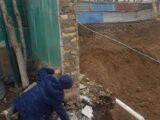UN concerned about reports of forced evictions in Uzbekistan
13.03.2022By Farida Sharifullina
The UN Committee on Economic, Social and Cultural Rightsconsidered the third periodic report of Uzbekistan at its 13th, 15th and 17th meetings, held on 22, 23 and 24 February 2022, and adopted the present concluding observations at its 30th meeting, held on 4 March 2022.
As we previously reported, at this session, Uzbekistani activists submitted their alternative report on violations of the Right to Adequate Housing (https://housing-uz.info/ru/en/834/).
The Committee generally welcomes the submission of the third periodic report of Uzbekistan and the additional information provided in the replies to the list of issues.
The Committee further notes the problems in contemporary Uzbekistan that have not yet been resolved.
Of all the Committee’s comments, we will cite here those which relate specifically to the Right to Adequate Housing.
Forced evictions
42. The Committee notes the information provided by the State party on measures adopted related to property and land deprivation. However, the Committee regrets the reports about the expropriation of property, demolition of houses and forced eviction in light of urban development projects. It is also concerned about reports on the non-compliance with the national legal framework on property deprivation, especially the absence of prior consultation with the affected residents and lack or inadequacy of compensation and alternative housing (art. 11).
43. The Committee recommends the State party to adopt legal and policy measures to:
(a) Ensure that evictions are carried out only as a last resort and in accordance with the law and in conformity with the provisions of international Covenants on human rights;
(b) If eviction does take place, ensure the respect of procedural protections and safeguards such as conducting genuine consultation, ensuring adequate and reasonable notice, availability of alternative accommodation in a reasonable time, and the provision of legal remedies;
(c) Ensure the availability and accessibility to affordable legal aid for affected residents;
(d) Prevent homelessness in cases of evictions by ensuring the availability of adequate alternative housing;
(e) Consider its general comment No. 7 (1997) on forced evictions.
Right to adequate housing
44. The Committee takes note of the information on the affordable housing programmes implemented by the State party. However, the Committee is concerned about the insufficiency of social housing especially for members of disadvantaged and marginalized groups and the lack of information on the situation of the residents impacted by the Sardoba Reservoir Dam burst in May 2020 (art. 11).
45. With reference to its general comment No. 4 (1991) on the right to adequate housing, the Committee recommends the State party to intensify its efforts to provide affordable and social housing, including to residents of the Sardoba region who lost their houses as a result of the flood in May 2020, persons with disabilities, Luyli/Roma,
refugees, stateless and asylum seekers.
Cultural rights
56. The Committee notes the information on the adoption of measures to increase the protection of cultural heritage sites. However, the Committee is concerned about reports on the demolition of houses and facilities in neighbourhoods near UNESCO World Cultural Heritage sites, in light of the urban development projects. (art. 15).
57. The Committee recommends that the State party ensure that the management and development of world cultural heritage sites are in line with the best practices recommended by the United Nations Educational, Scientific and Cultural Organization (UNESCO) and International Council on Monuments and Sites (ICOMOS), including
by providing for full participation by the local communities with a view to ensure their wellbeing and with full guaranty of the enjoyment of their cultural rights.
The whole text of the Concluding observations is avialable here: Concluding observations on the third periodic report of Uzbekistan


